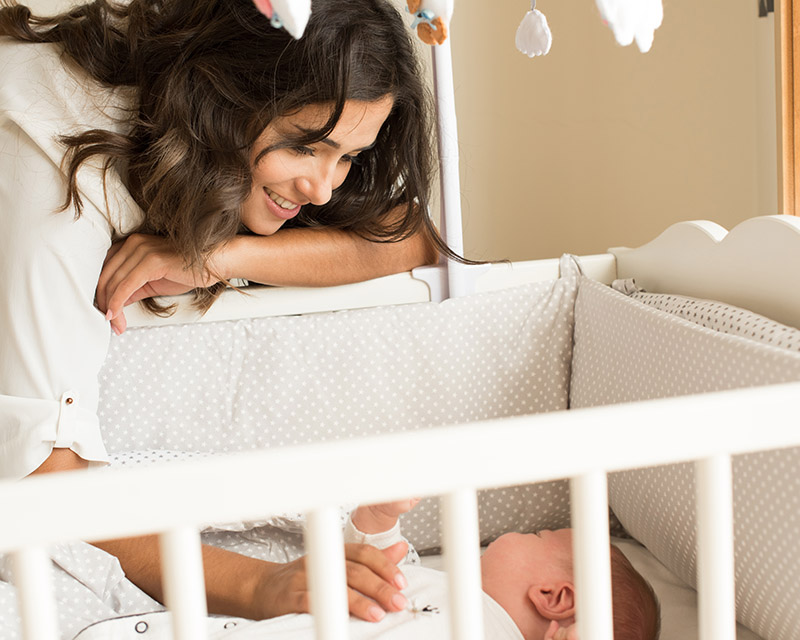
It was 3:30AM.
My daughter was 2 weeks old
I had seen every hour on the clock.
Earlier in the evening I had sent my husband to bed because he needed to work the next day. But here I was: exhausted, desperate and about to ruin his slumber.
I ran into our spare room where my husband was sleeping, handed him the baby and tried to get two hours of sleep in a row. I come back for the baby a couple of hours later to see HIM sleeping with the baby in his arms! It was my Oprah ‘a-ha’ moment: sleep is not a luxury, it’s a necessity!
While we may chuckle with a friend about how exhausting parenthood is, your child’s infancy (and sometimes beyond) can bring parents many sleepless nights if baby isn’t sleeping well–and that is no laughing matter. When we have tired babies, we have tired parents and tired parents are more likely to be involved in an accident, have a higher risk of heart disease, be obese, and even experience anxiety or depression. Sleep deprivation is no joke. And we know that after baby is 6 months and their circadian rhythms look more like adult ones, having broken nights of sleep means they feel just as tired and cranky as you do!
However, there is a light at the end of the tunnel. There are a few basics you need to know about baby sleep before you make any changes to way your baby falls asleep. Here are the basics that will answer the most common baby sleep questions and hopefully provide you with a starting point in helping your child become better rested.
Everyone has a sleep dance
“What?” you ask.
Yes! You read right. A sleep dance!
If I asked you to think about your sleep dance it would likely look like this: You hop into bed, take off your socks and turn to your right side. But in another 2 minutes you’re going to shift to your left side, put your hand under your pillow and shift your legs to and fro. These routines and actions are your sleep dance. And if your child or baby has you doing this dance for them (feeding, rocking, bouncing, swaying, pacifying etc.) it means that every time they wake, they will require that same ‘dance’ to fall asleep again…which is challenging because…

Your baby will never sleep through the night.
And neither will you for that matter! All human sleep is actually made up of several shorter cycles of sleep. Most adults have a sleep cycle of 90 minutes but because adults have independent sleep skills, we can get to the end of our cycle, wake, turn over and go back to sleep. A baby’s sleep cycle however can range between 30-90 minutes (depending on their age). This means it’s possible that a baby can wake every 30 minutes! And if baby does not have their sleep dance down, it means they will require a recital from mom and dad all night long! Some of you are nodding right now–if this is you, it means your baby does not have their sleep dance down and is lacking independent sleep skills
Becoming a professional soother replacer
If baby has any sleep associations (things that lully them to sleep: rocking, patting, swaying, swings, pacifiers, dock-a-tots, nursing, bottles etc.) it makes falling and staying asleep extremely challenging because these associations will all stop working. Whatever lulling effect is created by these associations will eventually wear off and you’re left swaying a crying baby for hours. How many of you have had to run back to baby’s room several times at night to replace a pacifier? When we remove the pacifier (or any other association) baby will sleep deeper and more consistently going forward.

So what now? Tips for success!
- Find a way to teach your baby independent sleep skills. Whether it’s with a consultant like me or with another program, method or practice that aligns with your family goals–teaching baby to sleep on their own is a must.
- Whenever you start a program don’t give up! Consistency is challenging with babies but its a MUST with any child. You can’t go half way and expect 100% results. If you want baby to learn to sleep, they must sleep unassisted every single time.
- Finally, get support. If your partner can’t be around to help, find a friend or family member to support you in helping baby sleep. It can be challenging and sometimes having another person to talk to through the challenges can be helpful (this is also why hiring a consultant is so great–we’re with you every step of the way!)
If you’re feeling like you’re ready to get you and baby to sleep, feel free to reach out! I (and many consultants!) offer free discovery calls to try to get a better sense of your sleep issue and let you know what working within a program may look like. You can reach me here: www.babysbestsleep.com/15mins
Good luck and teach that baby to dance!

